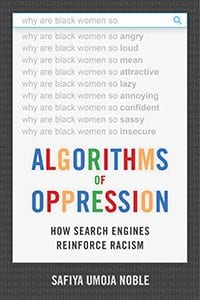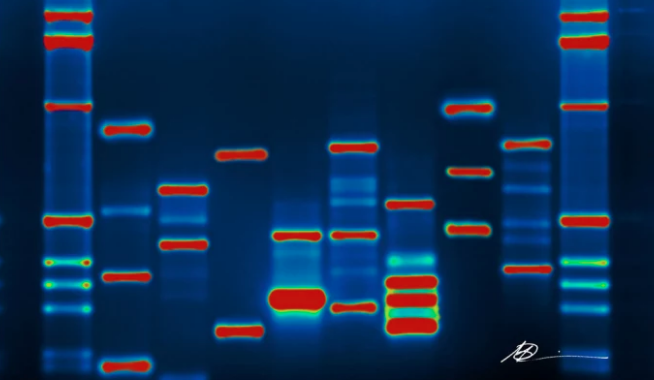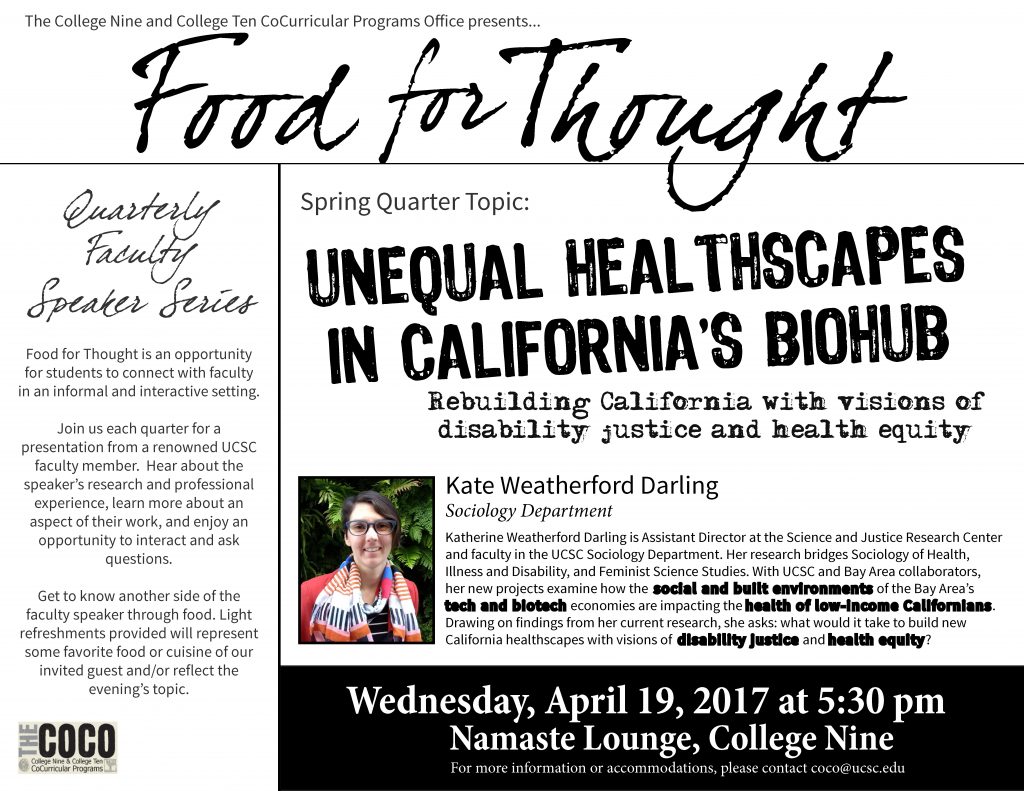"Fixing the Pathological Body"
SJWG Rapporteur Report
22 April 2015
Rapporteur Report by Jess Neasbitt
This event was organized to begin what we hoped would be ongoing discussions that addressed
themes and questions like the following: "The medical industry leans heavily upon a distinction
between the "normal" and the "pathological." How and why do we continue to define this
distinction, and for whom are these categories useful? What are some alternative ways to
organize the lived experiences of human bodies and/or minds?" We invited Drs. Dinishak and
Wolf-Meyer and Professor Ormond to introduce their research and engage in a panel discussion
regarding these questions, as well as those asked by the audience.
After a brief introduction of the panelists and the overall event theme by Jessica Neasbitt, Dr.
Dinishak spoke about her interest in issues surrounding “deficit attribution.” She forwarded this
model as a specific form of pathologizing difference, and encouraged the audience to consider
what (or whose) standard is being used to assess the lack, or absence of a feature that a person
“should have,” that is a hallmark of “deficit attribution.” Dr. Dinishak is interested in calling the
moral complacency surrounding this decision into question, as well as bringing the narratives of
the pathologized into the conversation. This led to a brief overview of her research regarding the
narratives of autists, which involves qualitative interviews, and speaks to her stated commitment
to finding responsible approaches to engage in such research in ways that acknowledge subjects
as “not just objects to study.” Instead, Dr. Dinishak encouraged the audience to consider what the
narratives of autists can teach us about the lived experience of those labeled autistic, the cultural
representation of these individuals, and what their (autists) concerns might be.
Following Dr. Dinishak, Professor Ormond discussed how disability is talked about in genetic
counseling. Building off of Dr. Dinishak’s talk, she mentioned the challenge of mixing lived
experiences of people with disabilities with discussions of risk assessment during counseling
sessions. She is interested in starting conversations that focus more on the former than on the
medical aspects of potential conditions a fetus may develop in order to move past parental fear
and into a space of more expansive possibility. Professor Ormond stated that, at the present time,
potential parents most commonly focus on the medical aspects of potential disorders/disabilities
over the lived experiences of those diagnosed with them, and this often leads them to constrain
their choices to either abortion or bringing the baby to term and keeping it (versus adoption and
other possible options).
Dr. Wolf-Meyer also discussed social fixes in contrast to medicalization, and gave examples
from his para-ethnographic work. Most of his examples involved the tendency to medicate rather
than seek social fixes, which often require the rethinking—and perhaps radical changing—of
powerful institutions. The influence of capitalism was a recurrent theme, not only during Dr.
Wolf-Meyer’s presentation, but throughout the panel discussion and the question and answer
period; however, the “normalization” required of subjects in capitalist societies was integral to
several key aspects of Dr. Wolf-Meyer’s talk. Among these were: the increase of medical and
pharmaceutical interventions to make individual bodies “fit” into existing social systems and the
dramatic decrease of any social “safety net” (public assistance for persons with disabilities).
The individual, and the individualization of responsibility, were recurrent themes throughout the
event—especially in relation to the influence of capitalism on the practice of medicine in the
United States. Many attendees questioned panelists on whether or not their proposed
interventions into these practices and/or institutions were realistic, given the tenacious hold of
capitalism and its current rigid practices. While there were some small-scale examples of
successful interventions given (communal living, alternative clinics that evaluate social fixes as
well as medical ones), this was the extent of the discussion, and—given more time—this would
be a fascinating avenue to continue exploring.
Another topic in which the concept of the individual loomed large was the genome. There were
several audience comments and questions regarding the power of the genome and the ease with
which risk scores that describe possible futures transition into labels that dictate identities. This
tied in with the parental fear that Professor Ormond had discussed earlier, and the question was
asked: Is fear a necessary part of medical care? Professor Ormond reiterated that this was one of
the limitations of genetic counseling, that there is no “gene for” (it is not as clear cut as that), and
that this is one of the reasons why she believes that discussions with genetic counselors might be
better framed in terms of “abnormal-normal, risk-chance.”
Most of the remainder of audience questions and comments can be divided into two categories:
those focused on the role of the history of eugenics and race in regard to processes of
pathologization, and those focused on the terminology used by the panelists. The history of
eugenics was mentioned by one panelist—Professor Ormond credited it as contributing to how
genetic counseling happens today. However, there were several excellent questions that brought
up the possibility that genetic counseling may be contributing to current eugenicist practices,
especially in relation to abortion of fetuses that are at increased risk for particular pathologized
conditions. While there was some further discussion of the relation of race, eugenics, and
pathologization, we were again limited by the format and time constraints of the event; however,
we all agree that this is an area of rich possibility for further events to explore.
Audience questions regarding the terminology used by the panelists were extensive, and also
limited by available time. Overall, these questions focused on the terms used to describe those
persons being pathologized, and why these specific words were chosen. Questions about the use
of the following terms were recorded: difference vs. deficiency, disorderly vs. disabled, disorder
vs. condition, atypical vs. abnormal, variance vs. diversity, and risk vs. chance vs. diagnosis. The
length and breadth of this list suggest yet another subject that could feasibly support its own
panel discussion; at the very least, it should be addressed in any future events planned as an
outgrowth of our event.
Our initial vision for this event was to begin a conversation regarding what work pathologization
does, and for whom. Overall, we agree that this panel was a good start to what we envisioned as
an ongoing dialogue, and we—along with our critical listeners, Jeff Sherman and Jen Trinh—
have many ideas as to aspects of our theme that future events might explore. These include
narratives and counter-narratives of pathologization, the role of institutions in pathologization
(and how this might be addressed), late capitalism and pathologization (especially regarding the
concept of “productive” bodies and the commercialization of pathology), disability activism, and
the history of pathologization—particularly in regards to race and eugenics. All of these topics
came up in one form or another during our event, and we all agree that the format of the event
severely limited our ability to allow the in-depth examination of any one of these rich lines of
questioning. However, these are topics that we think merit exploration and would make for
future events that would both continue the discussion that began during our event and interest a
wide variety of individuals and groups on campus and in the surrounding community.
As to the possible forms the continuation of this discussion might take, there are several that we
would like to forward. First (and most ambitious), we would like to suggest that, given the easy
division of our overall theme into the sub-topics mentioned above, a conference (or other multipanel
event) on this theme would be both one way to continue this discussion and have many of
the people who should be represented “at the table.” Regardless of the format of the event, we all
agree that future speakers must include disability rights activists, community members, and
narratives of pathologization that originate from the pathologized themselves. Suggestions for
future speakers included Mia Mingus and Leah Lakshmi Piepzna-Samarasinha; we also
acknowledge that more outreach and collaboration with the disability studies community on
campus should have been part of our process, and would highly benefit any future events that
stem from our event.
Other suggestions for keeping the discussion going dovetail nicely with the stated desire of the
Science and Justice Research Center for achieving more of an online presence. These include a
series of blogs (some of which would be guest authored), a series of podcasts and/or an interview
series, and a moderated online forum on the topic. The growing number of scholars working on
related themes on this campus, the presence of a healthy activist community (both on campus
and in the community), and the upcoming History of Consciousness concentration of
“Differences Now” all point to there being a good deal of interest in—and potential for joint
sponsorship of—a variety of events that could further the discussion that began during “Fixing
the Pathological Body” in new and innovative ways, and we look forward to seeing where this
discussion goes next.
In closing, Jessica, Linda and Sandra would like to thank our generous co-sponsors, without
which this event would not have been possible: the departments of History of Consciousness,
Literature, and Philosophy, the Institute for Humanities Research, and the Science and Justice
Research Center. We would also like to thank our critical listeners (Jeff Sherman and Jen Trinh)
for their time and extremely helpful feedback. To our panelists, Dr. Janette Dinishak, Professor
Kelly Ormond, and Dr. Matthew Wolf-Meyer, we wish to extend our sincere gratitude for your
participation and inspiring discussion, which we envision as the beginning of a much needed
exploration of the work, histories, and purposes of pathologization.
Attendance
There were approximately 26 attendees, the majority of whom hailed from the social sciences.
The remainder of the attendees were from the sciences and the community.




